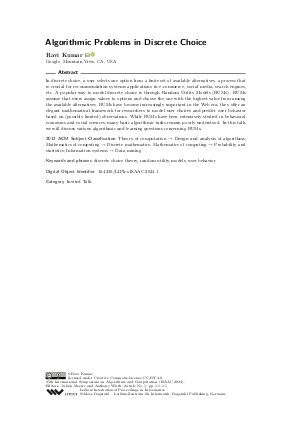Algorithmic Problems in Discrete Choice (Invited Talk)
Author
Ravi Kumar 
-
Part of:
Volume:
35th International Symposium on Algorithms and Computation (ISAAC 2024)
Part of: Series: Leibniz International Proceedings in Informatics (LIPIcs)
Part of: Conference: International Symposium on Algorithms and Computation (ISAAC) - License:
 Creative Commons Attribution 4.0 International license
Creative Commons Attribution 4.0 International license
- Publication Date: 2024-12-04
File

PDF
LIPIcs.ISAAC.2024.1.pdf
- Filesize: 317 kB
- 1 pages
Document Identifiers
Subject Classification
ACM Subject Classification
- Theory of computation → Design and analysis of algorithms
- Mathematics of computing → Discrete mathematics
- Mathematics of computing → Probability and statistics
- Information systems → Data mining
Keywords
- discrete choice theory
- random utility models
- user behavior
Metrics
- Access Statistics
-
Total Accesses (updated on a weekly basis)
0PDF Downloads0Metadata Views
Abstract
In discrete choice, a user selects one option from a finite set of available alternatives, a process that is crucial for recommendation systems applications in e-commerce, social media, search engines, etc. A popular way to model discrete choice is through Random Utility Models (RUMs). RUMs assume that users assign values to options and choose the one with the highest value from among the available alternatives. RUMs have become increasingly important in the Web era; they offer an elegant mathematical framework for researchers to model user choices and predict user behavior based on (possibly limited) observations. While RUMs have been extensively studied in behavioral economics and social sciences, many basic algorithmic tasks remain poorly understood. In this talk, we will discuss various algorithmic and learning questions concerning RUMs.
Cite As Get BibTex
Ravi Kumar. Algorithmic Problems in Discrete Choice (Invited Talk). In 35th International Symposium on Algorithms and Computation (ISAAC 2024). Leibniz International Proceedings in Informatics (LIPIcs), Volume 322, p. 1:1, Schloss Dagstuhl – Leibniz-Zentrum für Informatik (2024)
https://doi.org/10.4230/LIPIcs.ISAAC.2024.1
BibTex
@InProceedings{kumar:LIPIcs.ISAAC.2024.1,
author = {Kumar, Ravi},
title = {{Algorithmic Problems in Discrete Choice}},
booktitle = {35th International Symposium on Algorithms and Computation (ISAAC 2024)},
pages = {1:1--1:1},
series = {Leibniz International Proceedings in Informatics (LIPIcs)},
ISBN = {978-3-95977-354-6},
ISSN = {1868-8969},
year = {2024},
volume = {322},
editor = {Mestre, Juli\'{a}n and Wirth, Anthony},
publisher = {Schloss Dagstuhl -- Leibniz-Zentrum f{\"u}r Informatik},
address = {Dagstuhl, Germany},
URL = {https://drops.dagstuhl.de/entities/document/10.4230/LIPIcs.ISAAC.2024.1},
URN = {urn:nbn:de:0030-drops-221287},
doi = {10.4230/LIPIcs.ISAAC.2024.1},
annote = {Keywords: discrete choice theory, random utility models, user behavior}
}
